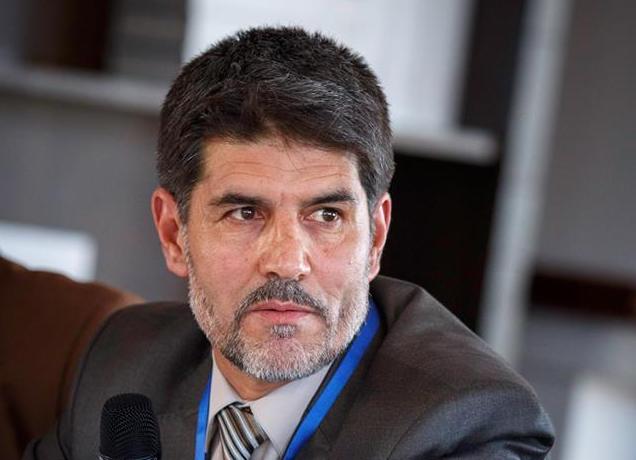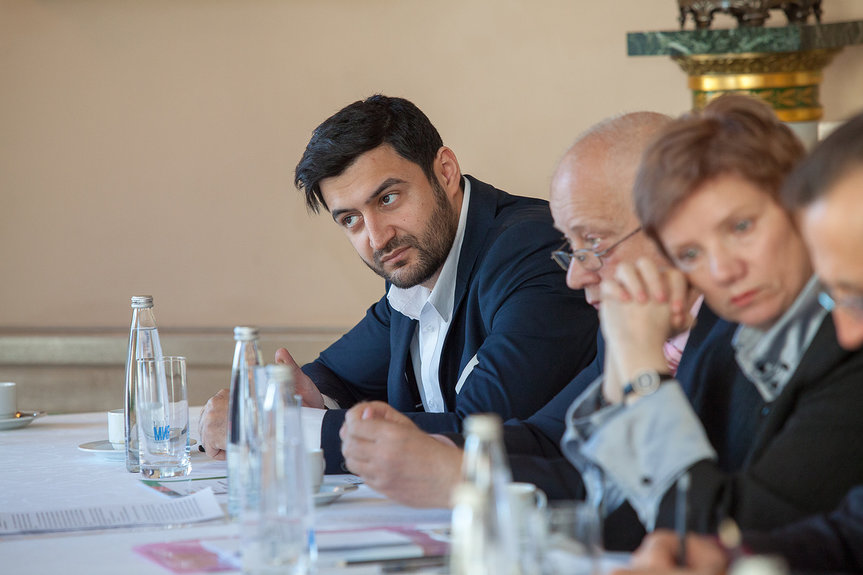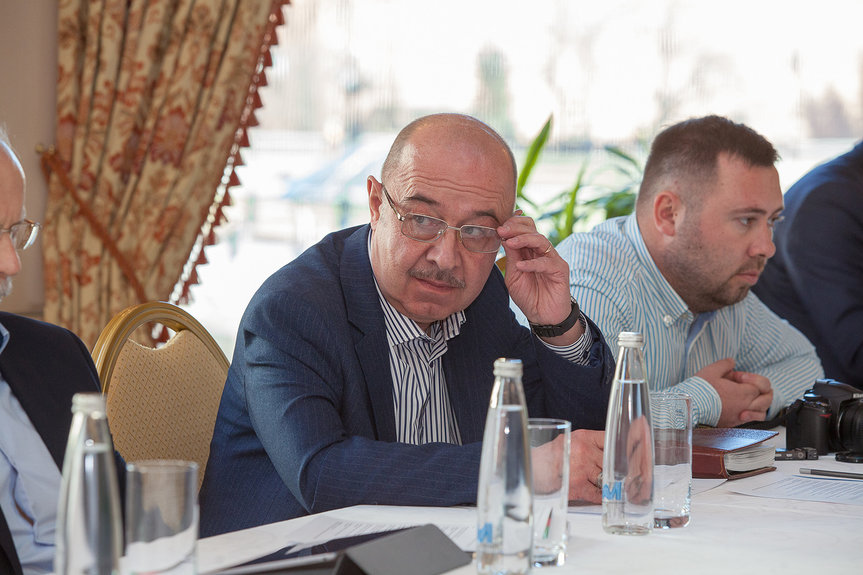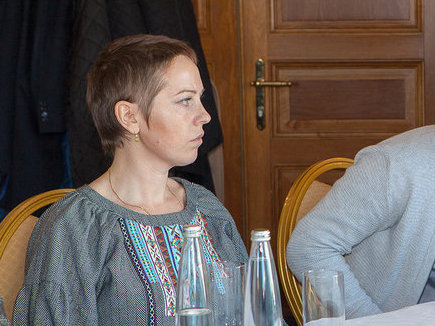
Ex-president of Afghanistan Hamid Karzai: «I understand perfectly well that if Russia build new relations with Pakistan and Afghanistan, it can help us. Not the British as we kicked them out of the country several times, not the Americans as they’ve been killing us for 17 years, but Russia only».
An international conference was held in Moscow on April 11 under the theme «Terrorism and internal political processes in Afghanistan. Transition from war to political solution within the context of regional activities». The Central Asian regional security conference was initiated and organised by Lev Gumilev Centre. All the participants of the conference, including leading orientalists from Russia, Afghanistan, Kazakhstan, Tajikistan, Kyrgyzstan and Belarus, had a unique opportunity to enjoy looking at the Kremlin from the historic hotel «National», which is located in the center of Moscow. This hotel is also historical and architectural monument.
Agenda had several important questions, including discussion of challenges and treats directed to the Central Asian region countries, cooperation between countries of the region on war with terrorism and drug trafficking. Participants have also discussed pros and cons of the monopolization of power in Afghanistan. They have also discussed possibilities of move the peace process forward that now seems most likely. Other points of the agenda have included effectiveness of regional peacemaking platform, especially the results of international conference in Tashkent under the theme «Peace process. Security cooperation and regional interaction». Participants of the conference have also noted the reasons for ethnic tensions, because it is the main cause of insecurity and rise of extremist organisations in Afghanistan.
Chief of Lev Gumilev Centre Pavel Zariffulin in his speech focused on the point that Moscow’s platform for discussion of security questions and transition to a peace process in Afghanistan has a number of advantages.
«Even though during the second round of Kabul Process Ashraf Ghani called on Taliban to start peace process on unprecedented conditions like recognition of Taliban as political party, he didn’t receive any official respond from them».
Head of the High Peace Council of Afghanistan, Karim Khalili has said that the Taliban doesn’t interested in start of peace process. He has also said that they will never give up.
The conference in Tashkent adopted a declaration. Main points of the declaration is that the peace process should be implemented by citizens of Afghanistan (Tramp’s administration is also agree) and Taliban will be recognised as political party.
Nevertheless, some members of Afghan’s parliament are confident that other countries of Central Asia will try to use Taliban for fighting ISIS.
Taliban members are looking for a direct dialogue with US, but US stand on the point that the conflict between this organisation and government is internal conflict and Afghans themselves should solve it.
Under this circumstances Moscow is ready to invite for a dialogue key regional countries like Pakistan. The SCO countries have also encouraged Moscow’s initiative in consulting on security questions within Central Asian region.
Unfortunately, US and other NATO members are pointedly ignoring consultations in Russia, though Moscow’s platform could become the only really working place for peace process in Eurasia, building on its historical experience of peaceful cooperation between different nations form Russian Empire period to building of the USSR», – Chief of Lev Gumilev Centre noted.
Zaki Daryabi, publisher and a chief editor of Kabul’s newspaper «Etilaatroz», gave a brief description of recent success in achieving peace process in Afghanistan.
«After a decade of stagnation, the process of dialogue with Pakistan has moved forward in the last 2 years, but relations with Pakistan are actually really very bad now. The second round of Kabul process can be considered as a very important, because Afghan government has made significant concessions. The government actually invited the Taliban to join political process in the country. It has also offered amnesty for all Taliban members who are currently being in prisons. Fighting ISIS can become some kind of cooperation point between National Unity government and the Taliban».
Unless Taliban is usually considered as one united group, actually there are many groups are on fully independent basis.
For some people, war in Afghanistan is only about the earning money. Therefore, it is hard to predict will be the conference in Tashkent useful for peace process or not.
«As for international community participation in Afghanistan’s peace process, first we should work out common systematic approach, and then we should work out and establish strategy for regional cooperation. After that, the most important, we should encourage participation of Pakistan as a valid speaking partner, which will be really interested in peace process, not only because of pressure from the US», – said Zaki Daryabi.
Khalil Fitri, who is the news director at Pajhwok Afghan News, noticed that in present Afghanistan the term «terrorism» itself could not be considered obviously. In his speech, he was talking about terrorism in Afghanistan and about internal political situation in the country.
«15 years ago the main slogan for Afghanistan authorities and western countries was the same. It was fighting the terrorism. It was obvious from the early beginning of war, which groups are terrorists and how they should be fought. Then, as conflict was longer and longer, even the term terrorism became unobvious. Perhaps, it is main problem in present Afghanistan: those, who had been terrorists, are no longer terrorists. It is also important, that western countries are not confident about whether Taliban is terrorist group or it is politic-military movement.
This kind of misunderstanding making the situation even worse, because government of Afghanistan seems to follow advices of some foreign organizations. Seems it doesn’t follow its own goals. The result is that ordinary Afghans are suffering. Furthermore, despite all the declarations, Afghanistan receive less help from international community than before», – Khalil Fitri said.
Lessya Karataeva, principal research scientist of the Kazakhstan Institute for Strategic Studies, had speech about main trends, which determine contemporary threats of terrorism. It is “return” of Al-Qaeda and change of status of ISIS.
«Now the key element of new Al-Qaeda strategy is transfer of terrorist activity to information space. As a result, we can see decrease of expeditionary terrorism and rise of homegrown terrorism – explosions in crowded public areas.
Umbrella structure of organisation was forced by franchise. Actually, it gives an opportunity to use local specific. Terrorist acts in western countries were strictly prohibited since 2013, because it could cause casualties among ordinary Muslims. It helped to build image of moderate extremists, which is opposed to the violent image of ISIS. Now Al-Qaeda is also have well-known representative, as before. Today it is Hamza Bin Laden, son of founder of the organisation.
As for ISIS, this organisation has used apocalyptic religious image since it was founded. Unlike Al-Qaeda, ISIS has created an extensive network of accounts in SNS field.
After ISIS has lost its positions on Syria, they had to change their strategy. At the end of 2016, ISIS offered its supporters to commit terrorist acts in their residential territory. ISIS started consider this activities as Jihad on Syria territory. Therefore, we see a new strategy of committing terrorist activity, which is actually does not cost much money, special training or complicated devices.
International community has faced a new way of propaganda of terrorist activity and violent extremism. Those who stand behind the propaganda, use a huge variety of different ideologies, the focus on different groups and use modern channels of spreading information», – Lessya’s point of view.
Omar Nessar, the director of Modern Afghanistan Research Centre made a speech dedicated to changes in politics and security in Afghanistan after 2014. He underlined the current crisis of legitimacy in Afghan political system and presence of separatist pressures.
«Afghanistan have to create or establish a new way of power division. There are some options, which have already been created by Afghan politicians. One of them is to give more power to a prime-minister of the country, because now the only person who has a lot of power is president. The other is to make parliament stronger. Moreover, there are some politicians who suggest even federalism.
The other reason for crisis of legitimacy is that electoral institution doesn’t match local traditions. For example, not every nation in Afghanistan wants to participate in elections. It is particularly for women.
We have also noticed a key change, that applies to interests of Russia and Central Asia. It is organized process of transferring zone of instability from south and east to the north of the country. Some politicians accuse president inner circle.
Maybe the best moment for Russia and Central Asia region to join the dialogue has passed. If Eurasia countries had respond to the gesture of ex-president Hamid Karzai, who refused to sign the security contract with US, wanting to receive support from neighbours, maybe everything would have been the other way.
Now Afghanistan also have some options to choose. It’s a real chance for Russia and other counties of this region to give real support to citizens of Afghanistan. From my point of view, Moscow’s platform is ideal to find solutions for Afghan problems», – Omar Nessar commenting.
Sohrob Gairat, expert of Gumilev Centre in Afghanistan has told about inter-ethnic divisions and serious disagreements both in leadership of the country and among armed opposition. Sohrob warned that in case if this problem won’t be solved, it can become real danger for other countries of the region. Expert also shared the information about appearing new Taliban division in Pakistan.
Nikita Karavayev, orientalist from Belarus, raised important question about security of Hazara young people amid conflict in Syria.
«Some Afghans think that Iranian Consulates recruit Hazara people to go to Syria and fight. They form Liva Fatemiyun division and come back as experienced soldiers under the control of IRGG. It is not actually 100% true. If they go to this division, they receive $500-700 a month, so they won’t come back to Afghanistan. At the same time, an average salary of migrant on the east of Iran is usually $70».
Valeriy Sinko, who is coordinator of Lev Gumilev Centre in Kyrgyzstan, raised an important question about participation of high-ranked officials in drug trafficking.
«The most profitable business in Kyrgyzstan is drug-trafficking. Authorities, police, criminal bands and couriers are involved in this process. Drug control services confiscated 18 tons of drugs in 2014 and 49 tons in 2015, after that it was dissolved.
There are 19% of all drugs cultivated in Afghanistan that go throw Afghanistan. It’s about 1837 tons.
Countries of this region should cooperate and fight against drug traffickers. If we don’t’ do it, than we have to cope with drug trafficking and terrorism».
Alexander Knyazev, orientalist, told participants from his point of view about process of monopolization of power in Afghanistan and paid attention to disadvantages of negation processes on different platforms.
«One of the main goals for Afghanistan is to create strong government, that is based on effective institutions, that can take control under the territory.
Now we can see different attempts to monopolize the power. It’s not about interest of the whole nation, it’s about interests of some tribes. For Taliban is also often when they are motivated by aggressive and ethnic nationalism. Such attempts will lead to lots of negative consequences
As for negotiation processes, the main weakness of these processes (including conference in Tashkent) is dualism. We see only two sides: Taliban and Afghan government. However, processes in Afghanistan are much more complicated.
The new splitting of the society should be also considered. Nowadays the main controller for financial climate for government, political interference is government. Therefore, the success of negotiations depends on whether US are interested in it or not.
Tashkent is interested in negotiations mainly because of economic reasons. Peace in Afghanistan can bring fresh air to economic model in modern Uzbekistan.
The main advantage of platform in Moscow is involving Pakistan in negotiation process. Peace process in Afghanistan cannot be reached without Pakistan. Unfortunately, platform in Moscow has lack of information support in Afghanistan».
Ramazan Daurov, who is chief at the department dedicated to Afghanistan of Institute of Oriental Studies in Moscow, told participants about the role of China in implementation of project about economic links between China and Pakistan.
Olga Ladygina, who is head of the department of cultural studies, pedagogics and psychology at Russian-Tajik Slavonic University, brought all participants to back. She was talking about the significant role of USSR in social and economic development of Afghanistan in 1980’s.
«Stable development of economics in Afghanistan was guarantor of development for all former Soviet Middle Asia Republics, which are independent states now. Unlike present US, USSR was helping financially and sent humanitarian aid to help develop national industries in Afghanistan. It was real support, and, by the way, it was for free.
To build national economic space in Afghanistan, there were built range of roads (about 70% of all roads in Afghanistan). These roads were built under control of USSR engineers. Road maintenance have also employed lots of citizens.
Furthermore, there were built grain elevators, bread factories, bread-baking plants, which supplied local markets with fresh food. It was solution for the problem of hunger either.
Transmission lines, research centers, public schools, resorts were also opened», – concluded Olga.
Faridun Usmonov, chief of the public organization named “Dialogue between civilizations” in his speech emphasized the importance of development regional economic projects. He meant projects, where Afghanistan, Tajikistan, Uzbekistan and Turkmenistan are involved. To show this, he named the distance between capitals and economic centers of this countries.
At the end of the event, all participants agreed on the opinion, that conference was concrete and well organized. The experts have prepared and shown concrete figures and facts. They have also agreed that still there is no better platform for negotiations, then Moscow’s, which has plenty of advantages.
Lev Gumilev Centre, represented by Chief Editor of af.gumilev-center.ru Anna Korolevskaya, express gratitude to participants of the conference for high-quality brainstorm and serious preparation to the event. First of all, Anna expresses gratitude to colleagues from Afghanistan for reliance and participation in this complicated dialogue.
«Russia and countries of Central Asian region are really interested in peace process and stability in Afghanistan. We will do our best, to make our nations live in peace. We will find a best solution for problems and call on the best among Afghan society to take destiny of the region to their hands. Thank you for attention», – concluded Anna Korolevskaya.
Press-service of Lev Gumilev Centre

















